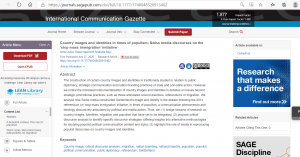We thought it might be a quiet week, this week, but we were wrong. The DfE has started the new academic year with a bang, and the Ofs are going to be busy.
So we are back properly to our weekly schedule although with a bit of flexibility on days of the week.
International student visas
The Home Office have made an announcement about student visas. The new international student immigration route is opening early, from 5th October to allow the “best and brightest” to apply for a visa under the new points based system. That includes EU students. This will mean that “as a result of coronavirus, some overseas students are choosing to defer their entry onto courses in the UK until the spring semester of 2021. Introducing these new routes now means that students will be able to benefit from the new streamlined process whilst still giving sponsors time to adapt after their autumn intake”.
The Secretary of State and the Minister for Universities speak
Gavin Williamson has been speaking to UUK. He starts with a bouquet of praise and thanks for the sector and almost an apology for the extra work on admissions this year, although not quite. There was always going to be a “but…”.
First he wanted to “land three key messages” related to the pandemic:
- Keep going – and he looks forward to working with us all as the situation evolves over the autumn term
- The importance of collaboration – specifically with local authorities.
- And to stay alert, which includes comms to students and keeping them at uni rather than sending them home if there are local restrictions
And then the “but”. It starts nicely:
- Too often, there can be an implicit narrative that every university needs to measure itself against Oxbridge. That if a university isn’t winning Nobel prizes and taking in triple A students it is somehow second rate.
- In reality, it is the diversity of our sector which will drive the levelling up agenda that is central to everything this Government does.
But…
- There are still pockets of low quality. One only has to look at the Guardian subject league tables to see there are too many courses where well under 50% of students proceed to graduate employment.
- But more fundamentally, in order to create a fairer, more prosperous and more productive country, we need to reverse the generational decline in higher technical education.
- We have already announced that, over the next few years, we will be establishing a system of higher technical education where learners and employers can have confidence in high-quality courses that provide the skills they need to succeed in the workplace, whether they are taught in a further education college, a university or an independent training provider.
- Of course, a large proportion of this will be delivered in our great further education colleges, but what I also want to see is for universities to end their preoccupation with three-year bachelors’ degrees and offer far more higher technical qualifications and apprenticeships. These would be more occupation focused and provide a better targeted route for some students, and benefit employers and the economy.
Again, none of this is new, he has been completely consistent. It will be interesting to see how the sector responds.
Michelle Donelan
There was a double act at UUK this morning, as the Universities Minister also spoke.
Again, lots of thanks and different examples too. “I want to say a special thank you. Thank you for bending over backwards to unlock the dreams and opportunities of this year’s cohort.”
Her speech is mostly about the bureaucracy reduction announcements set out below. But in return for this her speech also has a “but”. Her but is also consistent with what we have heard before. She wants:
- “readily accessible bitesized learning for people looking to upskill and reskill…. and also foster a culture of lifelong learning”.
And it comes with a carrot – or a stick – hard to tell which:
- “You will remember that the Augar review looked in detail at flexible learning and argued for widespread changes to the organisation and funding of higher education to enable that flexibility. And we will respond in parallel with the Spending Review. Rest assured, the global pandemic has not and will not throw us off course.”
Her last point was about mental health, and the need for on-going support.
Bonfire of the metrics (and general reduction of bureaucracy)
The OfS were due to review the NSS this year, and of course we are also waiting (and have been waiting for ever, it seems) for the government response to the Pearce review of the TEF. But the DfE have gone early. In a move which confirms what we and everyone else has been saying all summer, the DFE have confirmed that they only really care about outcomes (and continuation) and asked the OfS to do a serious review of the NSS by the end of the year.
The announcement is here. It is much broader than just the NSS, and there are some really interesting developments, so we will set them all out by area.
Starting with the Office for Students
“The measures outlined below are a combination of decisions taken by the OfS to help achieve those aims, and changes that DfE would like the OfS to implement. DfE will be following up this policy document with strategic guidance to the OfS,”
- Enhanced monitoring – the OfS intends to report to the DfE within 3 months on how it is reducing its use of enhanced monitoring
- Data futures – OfS has agreed to review the proposed termly data collection to make sure it is proportionate – also looking at making data collection more timely. Due by end October with final decisions alongside an OfS data strategy in April.
- Random sampling – the OfS has suspended this
- No further regulatory action on student transfers – this was a “big issue” in the original Jo Johnson Green/White Paper – students were being prevented or discouraged from transferring, apparently. The OfS has decided to review their current requirements for monitoring and consult on changes – but the headline suggests they won’t get more onerous.
- The announcement welcomes the already announced decision to make estates and non-academic data collected by HESA optional.
- Review of TRAC (T). The Transparent Approach to Costing for Teaching. This data was used by Augar to attack fees and the announcement recognises that the government have used it to look at efficiency. The OfS have been asked to review it because the sector have said that it is “disproportionately burdensome”. This year’s return has been cancelled. A “way forward” for the review is due by October alongside the UKRI review of the other stream of TRAC (see below).
- Review of the transparency condition – this is the monitoring data provided to the OfS relating to offers and acceptable, completion and outcomes, including by gender, ethnicity and background. The OfS have said that they will explore if the amount of information requested can be reduced and replaced by other sources, and the DfE are “pleased” with that. Due by end October.
- Reduction in OfS fees – the OfS have to review their own efficiency with a view to reducing fees, and to help them along the government’s review of fees (which are set by the Secretary of State) will take place this Autumn instead of next year. The QAA and HESA are expected to reduce their fees too.
So, the NSS. Hold on to your hats – these statements are bold!
- We have asked the OfS to undertake a radical, root and branch review of the National Student Survey (NSS)…..Since its inception in 2005, the NSS has exerted a downwards pressure on standards within our higher education system, and there have been consistent calls for it to be reformed. There is valid concern from some in the sector that good scores can more easily be achieved through dumbing down and spoon-feeding students, rather than pursuing high standards and embedding the subject knowledge and intellectual skills needed to succeed in the modern workplace. These concerns have been driven by both the survey’s current structure and its usage in developing sector league tables and rankings. While government acknowledges that the NSS can be a helpful tool for providers and regulators, we believe its benefits are currently outweighed by these concerns. Further, its results do not correlate well with other, more robust, measures of quality, with some of the worst courses in the country, in terms of drop-out rates and progression to highly skilled employment, receiving high NSS scores. Accordingly, the extensive use of the NSS in league tables may cause some students to choose courses that are easy and entertaining, rather than robust and rigorous.
- The government shares concerns raised by some in the sector that, in its current form, the NSS is open to gaming, with reports of some institutions deliberately encouraging their final year students to answer positively with incentives or messaging about their future career prospects. Academics have also criticised the cost and bureaucracy the NSS creates, arguing that the level of activity it generates can be a distraction from more important teaching and research activities. There is a sense that the level of activity it drives in universities and colleges has become excessive and inefficient. For example, we are aware that some providers employ analysts to drill down into NSS performance, in some cases at module level, and investigate any sub-par performance.
- Student perspectives do play a valuable role in boosting quality and value across the sector, but there is concern that the benefits of this survey are currently outweighed by the negative behaviours and inefficiencies it drives. Universities must be empowered to have the confidence to educate their students to high standards rather than simply to seek ‘satisfaction’.
Now, many people will agree with at least some of that. The sector blows hot and cold on the NSS – heavily critiquing its use in the TEF, then worrying that there was no voice for students when it was diluted in later iterations. Many have criticised it for being subjective and unhelpful (so not so much a criticism of the survey as a tool for driving improvements, as a criticism of its inclusion in the TEF and league tables) – but that was a case of the TEF using the metrics that they had, because there wasn’t anything else. Lots of people have criticised the methodology, despite the reviews that have been carried out before. Some universities have had consistent boycotts (Oxbridge).
But don’t think that abolishing it will mean that we can stop worrying about the underlying issues. The OfS have been asked (by the end of the calendar year!) to:
…undertake a radical, root and branch review of the NSS, which:
- reduces the bureaucratic burden it places on providers
- ensures it does not drive the lowering of standards or grade inflation
- provides reliable data on the student perspective at an appropriate level, without depending on a universal annual sample
- examines the extent to which data from the NSS should be made public
- ensures the OfS has the data it needs to regulate quality effectively
- will stand the test of time and can be adapted and refined periodically to prevent gaming
Expectations are high. No annual survey and yet reliable data….that reduces the bureaucratic burden, and prevents gaming and avoids lowering standards and grade inflation. Notably there are no positive suggestions about what a new approach actually will achieve other than “reliable data on the student perspective”. You might ask perspective on what? Not satisfaction, it seems, or even experience, but “quality and value”. It sounds like getting rid of it completely is on the table, replacing it with something else that isn’t a survey at all. But what? So this is your moment. What is the best way to get “reliable data on the student perspective”. We look forward to engaging with staff across BU on the inevitable OfS call for evidence.
Obviously the OfS have responded to all this. They seem to think that they will be keeping the survey. Maybe the requirement to avoid an annual universal sample means just that – not annual, not everyone, just a sample?
- ‘On the NSS, our review will seek to reduce any unnecessary bureaucracy, prevent any unintended consequences and gaming of the survey, whilst ensuring that the NSS stands the test of time as an important indicator of students’ opinions and experiences at every level.
UKRI and BEIS
UKRI are being asked to make a lot of changes
Selection
- simplify eligibility criteria for bidding
- streamline grant schemes
- streamlined two stage application process for grants – only necessary information provided at each stage
- single format for CVs
- “brand new, fully digital, user-designed, applicant-focused and streamlined grants application system with the first pilot launched in August”
- single information document for a call rather than lots
Assurance and outcomes
- harmonising reporting
- reducing the number of questions and making it “minimally demanding”
- enhance risk based funding assurance approach to reduce the burden and assure an organisation not individual projects
- review end of award reporting
Other things
- provide additional independent challenge (on costs and bureaucracy)
- Stop multiple asks for information that already exists
- review TRAC (as mentioned above)
NIHR
The NIHR are congratulated for already taking a number of steps to reduce the burden on researchers. Now there are a set of new commitments to take this further.
- Will consider ways of making peer review more proportionate
- “will immediately delete clauses which place obligations on research institutions which add limited value to the general research endeavour and end user from the standard NIHR contract”
- “review eligibility criteria for all funding streams including requirements for compliance with charters and concordats”
- Will drop the requirement for Silver Athena Swan – but instead “We will expect organisations that apply for any NIHR funding to be able to demonstrate their commitment to tackling disadvantage and discrimination in respect of the nine protected characteristics set out in the Equality Act (2010). These are: age, disability, gender reassignment, marriage or civil partnership, pregnancy and maternity, race, religion or belief, sex, and sexual orientation” [that sounds like more not less bureaucracy….]
- “NIHR currently obliges researchers, through a standard contractual provision, to notify DHSC of all publications associated with their research. ….This contractual clause will be deleted for almost all new contracts from 1st August 2020 “
Reductions in providers’ internal bureaucracy
What could this mean? Well:
- We …expect providers to ensure reductions in government or regulator imposed regulatory activity are not replaced with internal bureaucracy. In addition, we want them to go even further to enable academics to focus on front line teaching and research: stripping out their existing unnecessary internal bureaucracy, layers of management and management processes. [now that interesting, we flagged it a few weeks ago because it featured in the introduction to the financial restructuring document as an objective…but it is still unclear how this should be implemented – and one person’s internal bureaucracy is another person’s sensible internal control measure]
- There are a wide variety of organisations which offer voluntary membership awards or other forms of recognition to support or validate an organisation’s performance in particular areas. …. Such schemes can be helpful but can also generate large volumes of bureaucracy and result in a high cumulative cost of subscriptions. Where a university believes that membership of such schemes are genuinely the best way of addressing a matter, it is of course free to do so, but in general universities should feel confident in their ability to address such matters themselves and not feel pressured to take part in such initiatives to demonstrate their support for the cause the scheme addresses. [from the points made above, that probably includes Athena Swan – what else?]
- We will engage with the sector, and in partnership with research funding bodies across the UK, to tackle the broader issues that are often causes of unnecessary bureaucracy. [Like what?]
- This is also an opportunity to shift the research sector to more modern methods of research, which will help cut red tape too. This means embracing modern methods of peer review and evaluation. It also means tackling the problematic uses of metrics in research and driving up the integrity and reproducibility of research. Crucially, we must embrace the potential of open research practices.
David Kernohan was quick to respond on Wonkhe. One thing he points out is that the government are correct that the NSS does not correlate with highly skilled employment or outcomes. But he points out that the government’s favourite two metrics don’t correlate with each other either – and of course why would they.
Brexit
Have you missed it?
As you know, the trade deal with the EU has to be done by the end of the year because that is when the transitional period ends. It could have been extended, but the deadline to request an extension was 30th June 2020 – and there was no way this government (with its large majority all signed up to a possible no deal Brexit) was going to ask for an extension.
The deadline for a deal has similarly been a bit flexible – of course, and despite all the talk of dates, the most real deadline is 31st December. Originally it had been suggested that the deal needed to be done by July to allow for ratification – now both sides are saying that the EU leaders’ meeting on 15th October is the deadline. But no-one will really be surprised if it carries on after that. The withdrawal agreement was sorted in October last year, as you will remember and was then approved by Parliament in December 2020, receiving royal assent in January, just days before the UK left the EU on 31st January. It was close. The draft legislation wasn’t even published during all the backwards and forwards before the election, because it was such a hostage to fortune for the May government. Then Boris negotiated changes to the withdrawal agreement and “got it done”, just in time.
So, the government are getting ahead. Hence all the fuss about the new draft bill. Press coverage has been very excitable, especially as the NI Secretary confirmed in Parliament before it was published that the new law will “breach international law in a specific and limited way”. As many are saying, that is not usually a defence (“sorry officer, but I only [insert criminal offence of choice here] in a specific and limited way”). You can read the Hansard extracts here.
The Internal Markets Bill was published yesterday. If you want to read it, it is here, which is where you will also find all the amendments etc. as it goes through.
The Institute for Government have a short blog here:
- The bill would give ministers powers to make regulations about state aid and customs procedures for trade from Northern Ireland to Great Britain, and would allow ministers to make regulations inconsistent with the UK’s obligations under the Withdrawal Agreement.
- The existence of those powers is a breach of Article 4 of the Withdrawal Agreement, which provides that the UK must use primary legislation to give full effect to the Withdrawal Agreement in domestic law.
- However, unless the powers were actually used, the UK would not be in breach of the state aid and customs provisions of the Northern Ireland protocol.
So that answers that question.
And also:
- Perhaps more extraordinary than the bill’s provisions on international law are those on domestic law. Under s45(4)(g) of the bill, regulations made by the minister on state aid or customs declarations would have legal effect notwithstanding their incompatibility with “any rule of international or domestic law whatsoever”.
- This appears to be an attempt to oust the jurisdiction of the courts to review the legality of ministerial decisions under these powers at all.
- Such clauses are rare, and they rarely work. The courts have repeatedly found ways of reviewing government decisions even where similar clauses have tried to keep them out of the picture.
- That is because the judges consider them an affront both to the rule of law and to parliamentary sovereignty. “It is a necessary corollary of the sovereignty of Parliament,” the Supreme Court said in a case on this issue last year, “that there should exist an authoritative and independent body which can interpret and mediate legislation made by Parliament.”
- Section 45 of this bill will make uncomfortable reading for anyone who believes in the principle that governments are subject to the law, at home and abroad. It requires careful scrutiny in parliament.
The other concerns are about timing. We can look forward to the arguments being aired in full over the next two weeks.
So what is the issue?
From the BBC:
- The UK and EU settled on the Northern Ireland Protocol. This would see Northern Ireland continue to follow some EU customs rules after the transition period – meaning customs declarations would be needed for goods moving from Northern Ireland to Great Britain, as well as some new checks on goods going from Great Britain into Northern Ireland.
- It was unpopular with some sections of the Tory backbenches and Northern Ireland’s Democratic Unionist Party – which had been supporting the government until that point. But the agreement was passed through Parliament and the Northern Ireland Protocol became part of the international treaty.
You will remember all this, because the PM said there would be no checks, and then the government said well actually there would, etc…..
From the BBC again:
- Downing Street said one thing it would do is allow ministers to unilaterally decide what particular goods were “at risk” of entering the EU when passing between Great Britain and Northern Ireland, and therefore subject to EU tariffs.
- The law would also give ministers the powers to scrap export declarations on goods moving from Northern Ireland to Great Britain and would make it clear that EU state aid requirements – where governments give financial support to homegrown businesses – would only apply in Northern Ireland.
- But the government insists the bill only introduces “limited and reasonable steps” to “remove ambiguity” – not “overriding” the withdrawal agreement, as government sources had suggested on Sunday.
We will see. Maybe they are just making sure that there is time for proper Parliamentary scrutiny this time, by publishing something technical in good time rather than waiting for October when the deal is finalised and there is no time to discuss it properly. Or maybe it is sabre rattling. And why might they need to sabre-rattle? Because, apart from the NI border issue, there are also a couple of (unsurprising) issues outstanding in the main trade deal negotiations with the EU.
One is fishing rights, which was always going to be tricky. You will recall that at one point it nearly derailed the discussions last year when France and Spain demanded extra concessions at the last minute. There is an Institute for Government article from March and a Guardian article (from June).
And the other issue is state aid – the rules about supporting domestic businesses, which are seen as anti-competitive. There is an FT article on that.
We can expect a lot more rhetoric, bitterness, and positioning over the next few weeks. It is clear that the deal won’t be done until it is done, and also that all the other bits, like research collaboration and participation in Erasmus, are dependent on there being a deal at all. So we’ll just have to wait and see.
Subscribe!
To subscribe to the weekly policy update simply email policy@bournemouth.ac.uk.
Did you know? You can catch up on previous versions of the policy update on BU’s intranet pages here. Some links require access to a BU account- BU staff not able to click through to an external link should contact eresourceshelp@bournemouth.ac.uk for further assistance.
External readers: Thank you to our external readers who enjoy our policy updates. Not all our content is accessible to external readers, but you can continue to read our updates which omit the restricted content on the policy pages of the BU Research Blog – here’s the link.
JANE FORSTER | SARAH CARTER
Policy Advisor Policy & Public Affairs Officer
Follow: @PolicyBU on Twitter | policy@bournemouth.ac.uk



 I published the
I published the  The procedures for late submissions of external research and knowledge exchange applications has been updated in line with strategic guidance from UET to ensure that quality applications are submitted and adhere to BU’s financial regulations. The updated procedure can be found on the
The procedures for late submissions of external research and knowledge exchange applications has been updated in line with strategic guidance from UET to ensure that quality applications are submitted and adhere to BU’s financial regulations. The updated procedure can be found on the 












 BU attendance at third annual GCPHR meeting in June
BU attendance at third annual GCPHR meeting in June Interactive Tangible and Intangible Heritage Applications – BU student work featured in new book chapter
Interactive Tangible and Intangible Heritage Applications – BU student work featured in new book chapter Second NIHR MIHERC meeting in Bournemouth this week
Second NIHR MIHERC meeting in Bournemouth this week MSCA Postdoctoral Fellowships 2025 Call
MSCA Postdoctoral Fellowships 2025 Call ERC Advanced Grant 2025 Webinar
ERC Advanced Grant 2025 Webinar Horizon Europe Work Programme 2025 Published
Horizon Europe Work Programme 2025 Published Horizon Europe 2025 Work Programme pre-Published
Horizon Europe 2025 Work Programme pre-Published Update on UKRO services
Update on UKRO services European research project exploring use of ‘virtual twins’ to better manage metabolic associated fatty liver disease
European research project exploring use of ‘virtual twins’ to better manage metabolic associated fatty liver disease